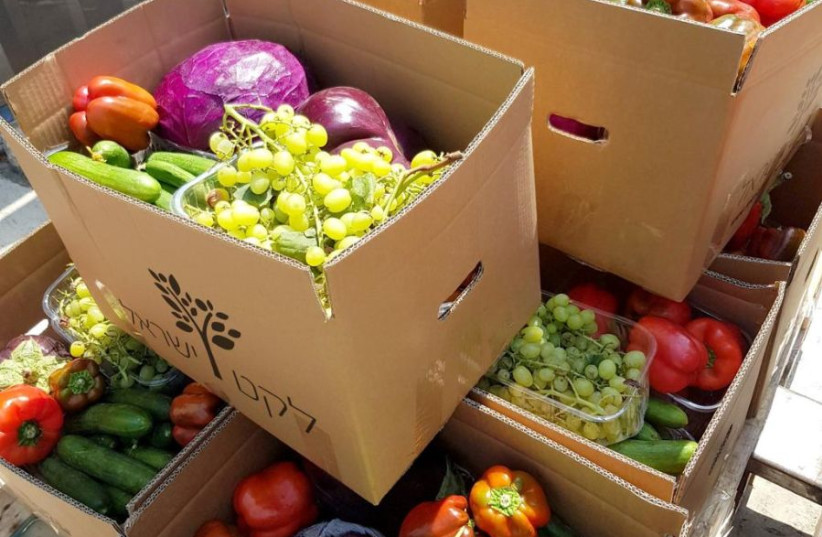The total amount of food loss in Israel in 2020 was 2.5 million tons, valued at NIS 19.1 billion, which is equivalent to NIS 615 per month per household, according to the Sixth Annual National Food Waste and Rescue Report.
The report, prepared by the BDO Israel accounting firm, was released by Leket Israel, a nonprofit charity, on Monday. It detailed the statistics behind Israel’s wasted food in 2020. The COVID-19 pandemic played an integral role in food waste for the year, in both positive and negative ways. Most notably, the report highlighted the need for a functional food-rescue program deployed by the government.
“The findings of the Sixth Annual Food Waste and Rescue Report illustrate the dire consequences and effects of the COVID-19 pandemic on the social and economic aspects and emphasize the urgent need for action and recognition by the state on food rescue, which can provide a complete response to millions of people already living with food insecurity and the tens of thousands of people who joined them due to COVID,” Leket Israel CEO Gidi Kroch said.
The pandemic exacerbated food insecurity in Israel, which is defined as a lack of consistent access to food necessary to lead an active, healthy life. It emphasized the importance of food rescue as a key policy tool to diminish it.
In 2020 alone, 150,000 people joined the circle of food insecurity. Those listed among the most affected by food insecurity were the elderly and the Arab and haredi (ultra-Orthodox) communities.

According to the report, rescuing just 25% of all the wasted food in Israel, at a cost of NIS 1.1b., would close the entire food insecurity gap in Israel.
“The great advantage of rescuing food is the ability not only to close the entire food insecurity gap in Israel by a quarter of the budget, but also higher utilization of resources and waste prevention,” Kroch said. “Additionally, food rescue helps reduce emissions and pollutants and strengthen the fight against the global climate crisis.
“Therefore, as recommended in the policy chapter of the report, the Prime Minister’s Office should lead and promote the preparation of an interministerial plan to advance the field of food rescue in a way that will holistically reflect the many benefits of food rescue.”
All of the public’s time spent at home in 2020 had a positive impact on food waste, and there was a decrease of 50,000 tons, according to the report. It cited online grocery shopping and at-home eating as two primary causes.
The explanation for the former is straightforward: In an online shopping environment, the food being sold need not be displayed, and therefore it is not sitting in an unrefrigerated storefront or exposed to unnecessary wear and tear, unlike the produce in a traditional open-market setting.
In the retail sector, the total loss of food in 2020 was approximately 420,000 tons, which constitutes a decrease of about 4% compared with food loss in 2019. The total value of food loss in the retail sector amounted to NIS 4.3b.
Though online shopping prevented some waste, it did not cut out all of the nation’s at-home food waste. In the household sector, food worth NIS 9b. was discarded, an increase of NIS 800 million compared with 2019. On the other hand, there was a decrease of NIS 2.2b. in the institutional sector, or a 50% reduction in the value of food loss compared with the year before.
At the same time, much of the food being produced (about 20,000 tons) was lost. The total value of agricultural food loss was 640,000 tons, valued at NIS 2.6b., an increase of about 3% in the quantitative loss compared with 2019.
The total amount of food loss in Israel was 2.5 million tons, the report said. Of the total food waste, 50% (1.1 million tons) of it was edible, sellable food.
The environmental cost of food waste in Israel as of 2020 was estimated at NIS 3.42b., of which NIS 1.35b. was due to the unnecessary waste of land and water resources, NIS 1.27b. in greenhouse gas and air pollution, and NIS 800m. as a direct cost of waste collection and processing.
“The Food Waste and Rescue Report in Israel indicates a close connection between food loss and the environment and the inconceivable cost we pay for this waste,” Environmental Protection Minister Tamar Zandberg said. “Food loss becomes waste that we then have to invest a lot of resources to treat. Reducing food loss is an important contribution to Israel’s compliance with the greenhouse-gas emission reduction targets that Israel pledged on the eve of last month’s climate conference of National Climate Change.”
At the climate conference in Glasgow, Prime Minister Naftali Bennett said Israel would become the “climate innovation nation.”
Food waste contributed to the emission of five million tons of greenhouse gases in 2020, which comprises about 6% of the total greenhouse-gas emissions in Israel.
Chen Herzog, chief economist at BDO and editor of the report, said: “It is an economic folly that in the year of COVID-19, in which there was an increase of 150,000 people living with food insecurity, no national food rescue policy was formulated. Food-waste prevention and food rescue are economic, social and environmental policy tools. Without formulating a national plan to rescue food and prevent food waste, we will not meet the climate goals and declarations of the Glasgow Conference to reduce greenhouse-gas emissions in the field of waste.”
